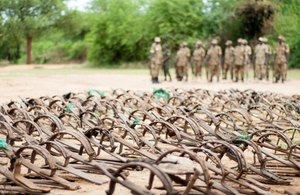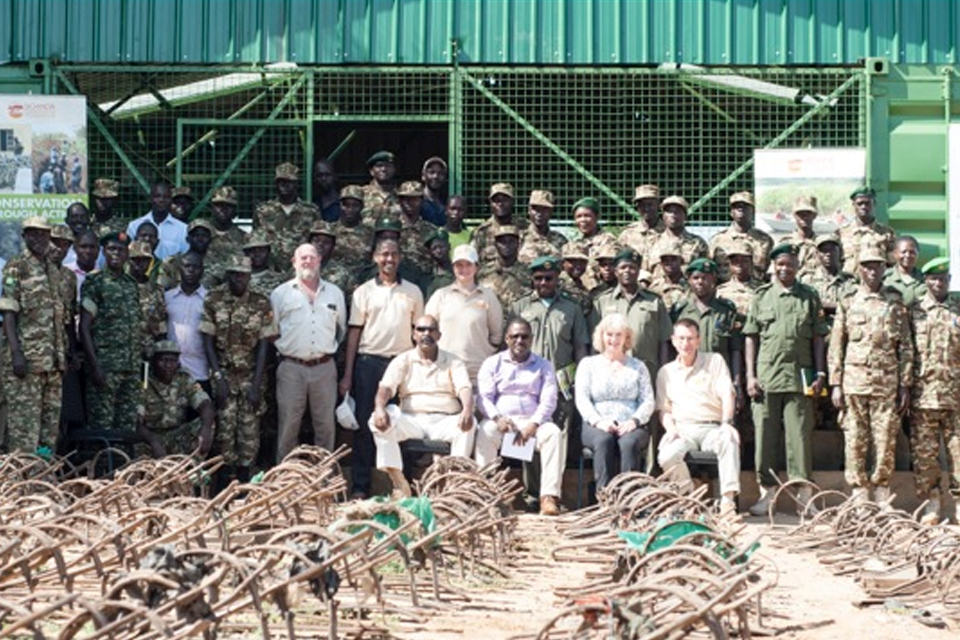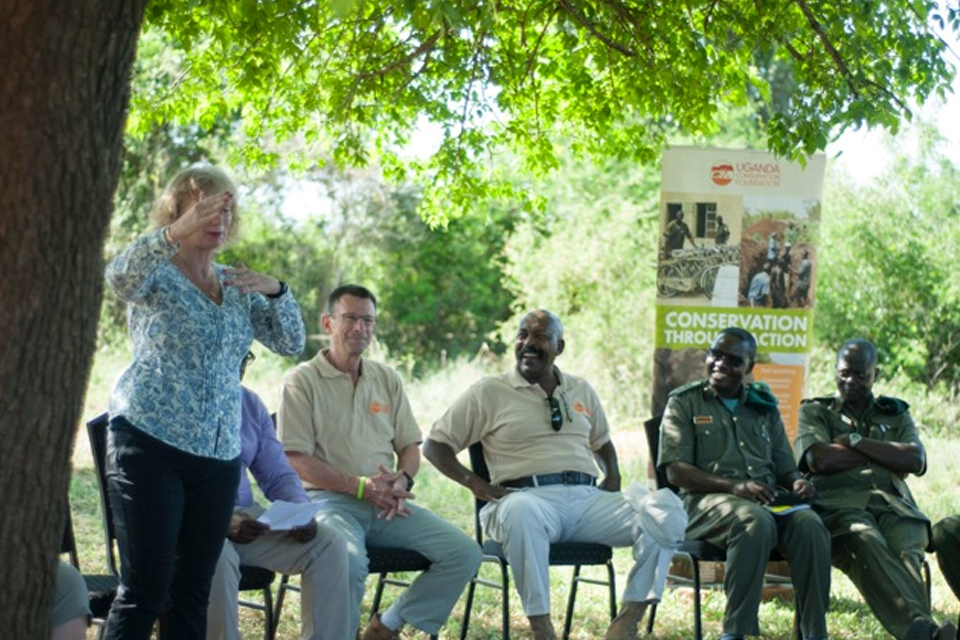UK hands over new anti-trafficking facility to Uganda Wildlife Authority
The facility in Murchison Falls Conservation Area provides secure weapons storage and other anti-trafficking capacity

Traps and snares recovered by game rangers on daily anti-poaching patrols. Photo by Will Clark
On Friday 15 April, the British High Commissioner HE Alison Blackburne formally handed over a new anti-trafficking facility at Murchison Falls National Park to Dr Andrew Seguya, Executive Director of the Uganda Wildlife Authority(UWA). The UWA Weapons Security & Anti Trafficking Centre is part of a £200,000 (one billion Ugandan shillings) project funded by the UK government in partnership with Uganda Conservation Foundation (UCF). The overall project includes the centre in Murchison Falls, a twin facility in the Queen Elizabeth Conservation Area, and training in evidence collection and analysis for UWA and the Natural Resource Conservation Network. Also present at the ceremony was Lt Gen Ivan Koreta, Vice Chairman of the UCF Board of Directors.

HE Alison Blackburne with UWA officials, UCF board members and game rangers. Photo by Will Clark
The new Weapons Security and Anti Trafficking Centre provides UWA with secure storage for weapons and exhibits, including the snares, traps and spears recovered daily by UWA anti-poaching patrols. It includes a decommissioning workshop, where UWA rangers can destroy traps by cutting them up with power tools, putting them permanently out of circulation. Much of the scrap metal produced by the destruction process can be taken to steel mills for smelting and reuse, increasing the sustainability of the project. The seized snares, traps and spears stored and destroyed at the UK-funded facility are illegally used by poachers and wildlife traffickers to hunt and kill endangered wildlife species and supply the illegal trade in bushmeat and ivory.
At the official opening ceremony, over 700 “wheel traps” and numerous snares, spears and pit saws were displayed in front of the UK-funded building, demonstrating not only the scale of the challenge, but also the success of the rangers’ work. UWA rangers conduct regular foot patrols in the park, removing traps and snares and apprehending poaching suspects.
The team at Murchison Falls, led by Conservation Area Manager Tom Okello, have successfully recovered key habitats, allowing wildlife populations to increase, but the work remains dangerous and challenging. Rangers risk their lives daily, as poachers are often armed and will fire at rangers on sight and the traps themselves are well hidden and are just as dangerous to humans as they are to wild animals.

HE Alison Blackburne speaks at the formal hand over ceremony of the new anti-trafficking facility at Murchison Falls National Park to the UWA. Photo by Will Clark
At the ceremony, Dr Seguya made clear the importance of campaigning for new legislation to ensure that these traps are recognised as lethal weapons, so that their manufacture, possession, transport and supply can be properly penalised. Seguya cited two rangers in Murchison who recently fell victim to these barbaric traps and were lucky to escape with their lives. The deadly contraptions require five or more men to re-open them, and in the remote areas where they are left, help is often hours away, so rangers can suffer a slow and painful death.
Lt Gen Koreta addressed the Dr Seguya and the High Commissioner, as well as the many UWA wildlife rangers gathered at the ceremony, on behalf of UCF:
After inspecting this facility I have found it to be very secure. From my own experience, there is nothing more important than ensuring your weapons are safe, and your men protected. For UWA, this is part of a wider challenge of securing the wildlife and the tourism potential of Uganda.
The High Commissioner responded by highlighting the hard work of the UWA in protecting Uganda’s natural heritage:
It is our hope that by supporting projects like this, your children and grandchildren may live to see and benefit from the rich biodiversity of this country.
The illegal trade in bushmeat and ivory not only threatens Uganda’s natural resources, but also harms the economy, by promoting illicit financial activity and degrading the country’s growing tourism sector, a major course of GDP. Wildlife trafficking is also linked to regional instability and armed conflict, as insurgent groups use profits from the trade to fund their activities. The Weapons Security & Anti Trafficking project is implemented by UCF in partnership with UWA, and funded by the UK’s Conflict Security & Stability Fund, through the British High Commission in Kampala.